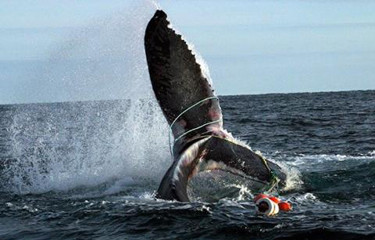In the second week of October, the Atlantic Large Whale Take Reduction Team will meet in Providence, Rhode Island, U.S.A. to discuss what efforts are necessary to stop the deaths of right whales, one of the most endangered species on the planet.
Those efforts will likely include some restrictions on various North Atlantic fisheries that use roped gear, such as the New England lobster fishery. A string of recent whale deaths has been linked to entanglement in fishing gear, such as one whale found floating near Martha’s Vineyard, Massachusetts, on 27 August.
Those entanglement deaths have already pushed regulators towards requiring any roped lobster gear to be removed from areas that right whales are known to be present, with month-long fishery bans proposed for certain areas. The threat has also led to some companies trying to innovate ropeless lobster gear in order to keep the lobster fishery working while roped gear is banned.
The need for action is dire, according to a recent report by NOAA. While the right whale had been in recovery, the series of recent deaths has put that recovery in question.
“At the current rate of decline, all recovery achieved in the population over the past three decades will be lost by 2029,” the NOAA report said.
In Maine, the lobster industry was recently awarded a grant to gather data on the affect of lobster gear on right whales. Finding out what impact Maine’s lobster industry has would be of vital importance to the states economy. In 2017, the state took in USD 434 million (EUR 376 million) in 2017, and generated another USD 1 billion (EUR 867 million) in post-dock revenue.
The lobster industry in Maine has been confident that the entanglements haven’t been caused by their gear. None of the whale deaths in 2017 could be directly attributed to lobster gear.
According to the Portland Press Herald, the state has proposed putting a mark unique to Maine on all gear used by lobstermen from the state so that regulators can rule out Maine fishermen from entanglements.
Proposals to be considered next week could have big impacts, with potential closures of the fishery in the Gulf of Maine south of Cape Elizabeth, Maine during April; reducing the number of traps lobstermen can use; and becoming a ropeless fishery by 2020 all options on the table.
Regardless of the method, the number of whale deaths in the past several months will likely lead to some form of regulation after the Atlantic Large Whale Take Reduction Team meets next week.







